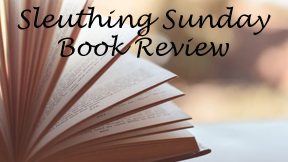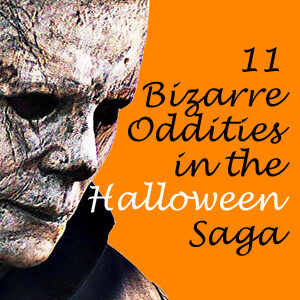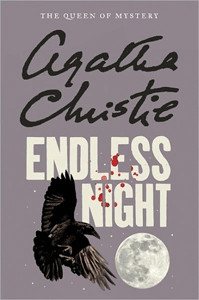“Endless Night” (1967) is often ranked as the Agatha Christie novel that most fits the horror label. Although I give a slight edge to proto-slasher “And Then There Were None,” this one has some genre bona fides. It’s dripping with mood, as narrator Michael and bride Ellie move into their newly built home at Gipsy’s Acre, an isolated lot surrounded by woods and overlooking the water.
A moody abode
By now, we know hints of the supernatural will have logical explanations in the Christie-verse (except in the occasional short story). But it’s nonetheless foreboding when local gypsy Mrs. Lee takes palm readings of the newlyweds and warns them to leave Gipsy’s Acre immediately.
Like other later-career Christies, “Endless Night” is a little repetitive, but that’s not a flaw here like it is in, say, “Third Girl.” Partly, this is because it’s narrated; people repeat themselves when working through their thoughts. Partly, it’s because this is a mood piece, not a mystery (the murder happens quite late in the book).

“Endless Night” (1967)
Author: Agatha Christie
Genres: Mystery, romance, horror
Setting: Gipsy’s Acre, England, 1967
Christie often builds her books around poems, nursery rhymes or Shakespeare phrases, and this is one of her best selections, one so lyrical that I don’t mind when it’s repeated. It comes from William Blake’s “Auguries of Innocence”:
Every night and every morn,
Some to misery are born,
Every morn and every night,
Some are born to sweet delight.
Some are born to sweet delight,
Some are born to endless night.
My short review is that “Endless Night” is a delight to read, and one of the best late-career Christies. My long review requires a notice that SPOILERS FOLLOW.
A career-long magic show
Christie’s career, in a way, is a magician’s performance. In one of her early Poirots, the narrator is the murderer. From then on, we keep a wary eye on narrators, but we also figure that she won’t play that card twice. In “Endless Night,” she plays it again, and she tricked me again. Yet this is not exactly the same trick.
For one thing, this book is primarily in a different genre: romance. “Endless Night” starts where a lot of her books would finish: with the “happily ever after.” Two people fall in love basically at first sight (or at most, after the brief adventure of the novel) and decide to get married.
This novel comprises, for much of its run, the internal thoughts of a happily married Mike. He deals with minor annoyances like a mom who knows him too well and people who look at him askance for moving up in class via his rich wife.

The book opens with him telling us how he loves his dream house, and his love for Ellie doesn’t quite equal that. Thus, I was suspicious. But I give narrators the benefit of the doubt. Yes, he’s obsessed with his house, but there are worse traits, right?
Double meanings
As it turns out, Mike has a worse trait: He’s a sociopath who has calmly been playing out a long con. His secret lover Greta first poses as Ellie’s bestie, then Mike pretends to fall in love with Ellie. They’ll kill her and enjoy her riches.
This was my first read of the book, but my friend Morgan recently read it for a second time. She said Mike reads as a sociopath once you know he is one. It’s similar to how “Crooked House” is a study of that killer’s issues on the reread. (Fascinatingly, she also read Ellie as suspecting that Mike might kill her – rather than merely sensing vague evil in the air. But Ellie resolved to be happy with him until the dreaded day came. So “Endless Night” gets creepier on a reread — that’s quite a feat.)
I give “Endless Night” full marks whereas I dinged “Towards Zero” because I found its reveal of the secret sociopath unbelievable. Here, I believed it – even though I didn’t see it. All the double meanings click upon the reveal: Mike’s mom knowing him “too well,” Mike’s inexplicable (faked) dislike for Greta, and the warning from the architect that Mike “went the wrong way.”
In its favor, “Endless Night” is a character study – rather than a puzzle mystery – from the start. I falsely read it as a “happily ever after” love story (as was intended by the author), but that doesn’t matter because I was absorbing Mike’s character subconsciously.
A deep tragedy
Once Mike is caught murdering Greta — his “grass is greener” syndrome having run out of control — “Endless Night” becomes a deep tragedy. He realizes he was happiest when he was married to Ellie. His fake marriage had morphed into a real marriage, but he didn’t recognize his happiness until he had a basis for comparison.
Christie writes beautifully in the closing chapters. Mike’s faculties become untethered even as he narrates right to the end.
The author has long been interested in the question of whether psychologically unstable people deserve sympathy, and “Endless Night” is perhaps her strongest example of grappling with this question.
I feel Mike has no one to blame but himself, and I know he has unjustly killed people. But I also recognize that his brain has been wired wrong since birth. The freedom to kill without compunction isn’t as freeing as it seems from the outside, Christie tells us. Mike can never fully experience sweet delight, because on the inside, his life is endless night.
There’s no smooth societal solution to the conundrum of people who can’t stop themselves from doing evil. In “Endless Night,” Christie chillingly leaves a reader with that uneasy truth, but also with the satisfaction of having read great literature.
Sleuthing Sunday reviews an Agatha Christie book or adaptation. Click here to visit our Agatha Christie Zone.

